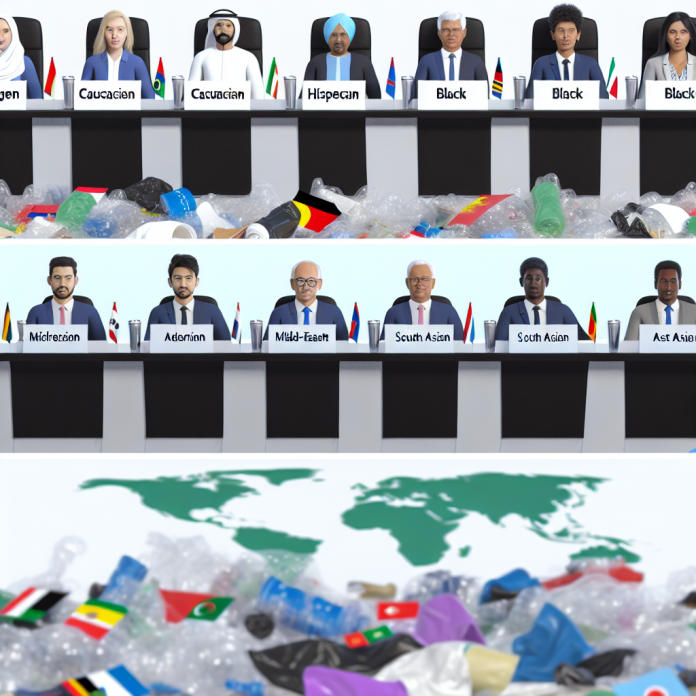US plastics treaty participation marks a significant turning point in international environmental cooperation, particularly considering the past reluctance of the Trump administration to engage in global agreements. As discussions unfold in Geneva, the urgency to devise a comprehensive plastic pollution treaty becomes increasingly apparent, amid growing concerns over the impact of the plastic industry in the US. With a market exceeding $500 billion and substantial employment at stake, the negotiation process promises to address crucial aspects of plastic production, design, and waste management. Critics argue, however, that the U.S. stance—focused on technological innovation rather than production limits—may undermine potential progress on environmental regulations. As nations grapple with the balance of economic interests and sustainable practices, US participation in the plastics treaty not only holds the key to effective solutions for plastic pollution but also reflects a broader commitment to international collaboration.
Engagement in the negotiations surrounding plastic waste agreements underscores a pivotal moment in the United States’ approach to global ecological issues. With the stakes involving both environmental sustainability and economic vitality, the ongoing talks in Geneva aim for the development of an international framework to combat the expanding plastic crisis. The historic participation of the US, after a period of isolation during the Trump administration, signifies a renewed willingness to address challenges posed by the pervasive plastic industry. As discussions revolve around strategies for enhancing recycling capabilities and innovating product designs, the U.S. must navigate the fine line between industrial growth and pressing environmental responsibilities. Ultimately, the outcome of these treaty negotiations could reshape both national policies and international efforts to mitigate plastic pollution.
Understanding the Scope of the Plastic Pollution Treaty
The plastic pollution treaty aims to address one of the most pressing environmental challenges of our time: the pervasive contamination of our ecosystems by plastic waste. This international treaty, introduced during discussions in Geneva, seeks to unite nations in a concerted effort to mitigate plastic pollution through legally binding agreements. With an estimated 300 million tons of plastic produced annually, the treaty’s framework is essential for establishing a global standard for reducing plastic waste and promoting sustainable practices across industries. As countries gather to align their policies, the treaty represents a critical step towards global cooperation in environmental regulation.
Key elements of the treaty include rigorous measures for waste management and enhanced product design, which prioritize sustainability and environmental health. By addressing the full life cycle of plastics— from production to disposal—countries aim to enact comprehensive regulations that significantly curb plastic emissions. As outlined in the discussions, the treaty’s goal is not merely to reduce plastic waste but also to foster a paradigm shift in how industries handle plastic, ensuring that environmental considerations are integrated into the core of industrial processes.
The U.S. Role in the Plastics Industry and Treaty Negotiations
The plastics industry in the United States is a substantial economic force, generating over $500 billion annually and providing employment for roughly one million people. As the U.S. engages in plastic pollution treaty talks, it becomes crucial for American representatives to advocate for the industry’s interests while also promoting environmental sustainability. This balance is particularly challenging given the Trump administration’s historical hesitations toward international treaties, often prioritizing economic growth over global cooperation on environmental regulations.
During the treaty discussions, U.S. negotiators have been vocal about their opposition to capping plastic production, arguing that such measures could stifle growth within the plastics sector and jeopardize jobs. Instead, the U.S. has emphasized strategies that focus on enhancing recycling and waste management infrastructure. By advocating for better waste collection and promoting product designs that facilitate recycling, the U.S. displays its aim to lead the charge in innovation while participating actively in international efforts to combat plastic pollution.
Frequently Asked Questions
What is the U.S. participation in the plastics treaty and its significance?
The U.S. participation in the plastics treaty marks a significant commitment to international cooperation on addressing plastic pollution, counteracting previous withdrawal trends under the Trump administration. This engagement aims to develop a global framework to reduce plastic waste and promote sustainable practices within the plastic industry.
How does the U.S. position on the plastic pollution treaty differ from its historical stance under previous administrations?
Under the Trump administration, the U.S. withdrew from many critical international agreements, particularly related to climate change. However, with current participation in the plastic pollution treaty discussions, the U.S. is shifting towards a more proactive role in tackling global environmental issues, specifically concerning plastic pollution.
What are the main goals of the international treaty on plastic pollution that the U.S. is participating in?
The primary goals of the international treaty on plastic pollution include establishing global agreements to curb plastic waste, enhancing recycling and product design, improving waste management, and potentially regulating plastic production. The U.S. advocates for effective waste management while opposing strict production caps, emphasizing economic growth and job creation.
What implications does U.S. participation in the plastics treaty have for the domestic plastic industry?
U.S. participation in the plastics treaty is pivotal for the domestic plastic industry, valued at approximately $500 billion and employing about 1 million people. This involvement aims to align industrial interests with environmental regulations, ensuring that the U.S. can both protect its economic interests and contribute to combating global plastic pollution.
What challenges does the U.S. face in advocating for its interests during the plastics treaty negotiations?
During the plastics treaty negotiations, the U.S. faces challenges balancing the interests of the plastic industry with the urgent need for environmental protections. Critics argue that the U.S. proposals may lack the ambition required to establish effective global regulations against plastic pollution, leading to potential conflicts in achieving a consensus among participating nations.
How might the proposed plastics treaty impact environmental regulations in the U.S.?
The proposed plastics treaty could significantly influence environmental regulations in the U.S. by promoting better waste management practices and enhancing recycling initiatives. However, the U.S. opposes strict regulation on plastic production, indicating a preference for solutions that stimulate growth within the plastic industry rather than restricting output.
What role do negotiations at the plastics treaty play in global environmental efforts?
Negotiations at the plastics treaty are crucial for global environmental efforts as they bring together representatives from 184 countries to address plastic pollution head-on. This collective approach aims to create actionable agreements that can foster collaboration, improve waste management, and ultimately reduce the environmental impact of plastics.
How does the U.S. plan to influence the outcome of the plastics treaty negotiations?
The U.S. plans to influence the outcome of the plastics treaty negotiations by advocating for provisions that focus on waste management improvements, product design innovations, and enhanced recycling measures, while resisting proposals that mandate production caps, thereby promoting U.S. economic interests alongside environmental responsibility.
| Key Point | Details |
|---|---|
| US Involvement | The US is participating in UN treaty talks to combat plastic pollution, marking a rare instance of international engagement under Trump. |
| Plastics Industry Value | The US plastics industry is valued at $500 billion and supports around 1 million jobs. |
| Treaty Goals | Negotiations are aimed at creating a global treaty to tackle plastic pollution over the next 10 days, considering various approaches such as production limits and recycling improvements. |
| US Stance | The US opposes production caps, advocating for enhanced waste management and recycling initiatives instead to spur economic growth. |
| Negotiation Participants | Approximately 3,700 representatives from 184 countries and over 600 organizations are taking part in the discussions. |
| Industry Support vs Activists | While the US industry backs the current proposals, environmental groups criticize them for lacking ambition in effectively regulating plastic usage. |
| Future Outlook | The US aims to draft a treaty that can balance industrial interests with environmental protections, but skepticism remains about achieving an effective treaty. |
Summary
US plastics treaty participation signifies a crucial step in addressing the global crisis of plastic pollution. As the US engages in this international dialogue, it seeks to find a middle ground that both protects its economic interests in the vast plastics sector and addresses the pressing environmental challenges posed by plastic waste. With significant stakes involved, the outcome of these negotiations will impact not just the industry but the future of our planet’s health.
Source: https://www.ocregister.com/2025/08/08/plastic-pollution-treaty/
### Discover the Best Remodeling Services in Orange County: Elevate Your Home’s Value
As Orange County homeowners look to enhance their living spaces, the demand for responsible and innovative remodeling services is at an all-time high. With a median home value of $1.18 million, investing in renovations in cities like Laguna Beach, Newport Beach, and Irvine can significantly boost property values and improve quality of life. Homeowners planning high-value renovations ranging from $50K to $500K will find that partnering with skilled OC contractors is essential for navigating the complexities of local building codes and permits.
### Navigating Remodeling Permits in OC: Essential Insights for Homeowners and Contractors
Understanding California building codes is crucial for any successful remodeling project in Orange County. Contractors must be well-versed in local regulations, especially when working on high-end projects in affluent areas such as Costa Mesa and Huntington Beach. The OC climate also plays an important role in remodeling decisions. Homeowners should consider energy-efficient materials and designs that withstand the coastal weather. By keeping abreast of the permitting process and local regulations, contractors can save clients time and money, creating a smoother remodeling experience.
### Opportunities for Contractors: Tapping into the OC Market
The affluent demographics of Orange County present lucrative opportunities for contractors and remodelers. With a growing interest in sustainable building practices and luxury home enhancements, OC-based professionals can leverage local suppliers who specialize in high-end materials and eco-friendly options. Additionally, contractors can offer their clients insights into tailored financing solutions that align with the OC real estate market, making it easier for homeowners to pursue costly renovations. Engaging in community events or workshops can also help contractors build lasting relationships with potential clients.
### Call to Action: Connect with Local Experts for Your Remodeling Needs
With the current market trends, now is the perfect time for OC homeowners to engage with local remodeling professionals. Whether you’re considering a kitchen overhaul in Irvine or a bath remodel in Laguna Beach, the right contractor can turn your vision into reality while navigating regulations and adhering to quality standards. Contractors are encouraged to reach out and expand their networks within the local industry. Together, we can elevate the home transformation experience in Orange County and help homeowners create the dream spaces they desire.


